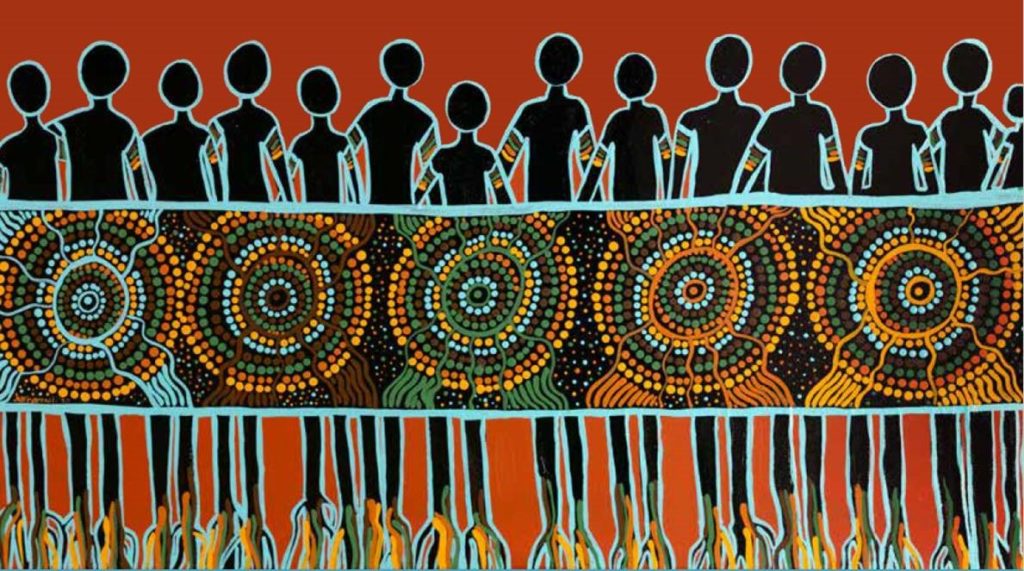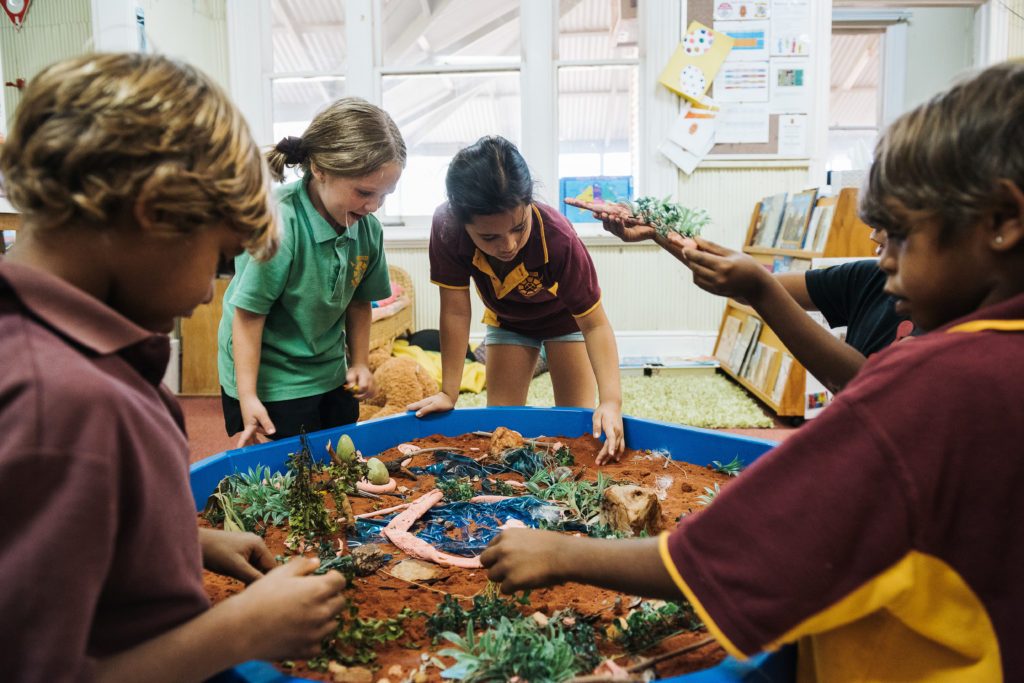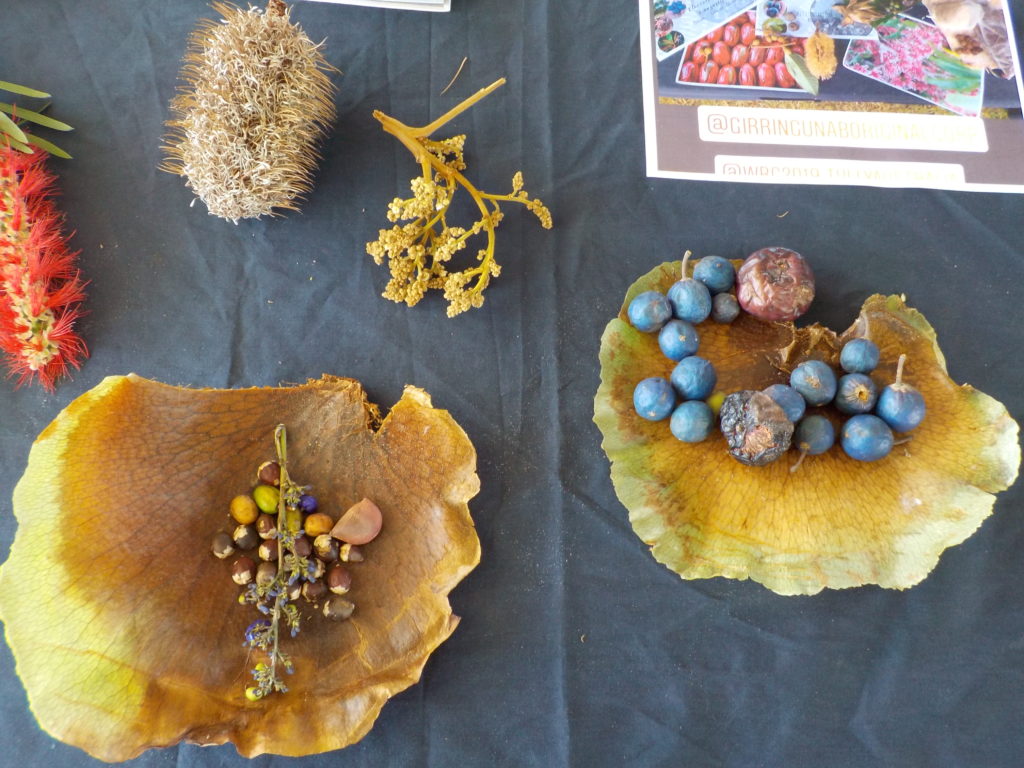
Our knowledge our way in caring for Country: Best practice guidelines from Australian experiences. Art by Emma Burchill.
This week is National Reconciliation Week. It’s a chance for us to improve our understanding of the world’s oldest continuous living cultures. It also shines a light on our work in partnership with Aboriginal and Torres Strait Islander communities. So, hear from some of our people on their work supporting Indigenous science excellence.
Indigenous science from ship to shore
Hannah McCleary is an Indigenous cadet with our Marine National Facility. She’s helping coordinate our Indigenous Time at Sea Scholarship. The scholarship gives Aboriginal and Torres Strait Islander students the opportunity to experience real-world research. And what better place to get a taste of a science career than onboard our RV Investigator.
The first voyage for scholarship students took place in December 2019. So, Hannah joined two Indigenous students Sophie Gilbey and Tiahni Adamson for the voyage.
As they travelled from Darwin to Fremantle, the students took part in a few science projects on board. From weather radars and atmospheric studies to microplastics and plankton sampling and seabird and marine life observations.
“The students gain valuable experience on board RV Investigator. It’s something many scientists spend their entire careers aiming for. And we hope to ignite passion within students to continue to study and pursue careers in marine science,” Hannah said.
“Aboriginal and Torres Strait Islander people have a unique connection to land and sea. This provides a perspective on science that has evolved over more than 60,000 years.”
Two-way science at school

Image credit: David Broun.
David Broun works with our Science Pathways education team. They work in remote schools and communities to develop two-way science learning programs. These programs connect Indigenous ecological knowledge and the Australian curriculum.
“Two-way science is the delivery of learning on Country to remote school students by Indigenous Elders,” David said.
“Schools, Indigenous rangers and scientists work together to build learning programs that celebrate and value the cultural knowledge of the community. Plus, an incredible outdoor classroom offers great two-way science opportunities.”
“We developed a book of education resources called Two-way Science: An Integrated learning program for Aboriginal desert schools. It initially sold out but now we have reprinted it.
“We are seeing two-way science in places we didn’t expect. In remote schools but also regional and urban classrooms. And we couldn’t be happier,” he said.
Science Pathways for Indigenous Communities is part of the Indigenous STEM Education project funded by the BHP Foundation and delivered by us.
Our knowledge our way
Dr Emma Woodward is a research scientist working on northern Australian socio-ecological systems. Her work helps integrate diverse knowledge, values and interests for improved natural and cultural resource planning and management.
For example, Emma advised on a project on knowledge brokering for Indigenous land management. This involved working with an Indigenous-majority steering group. The group raised the importance of documenting lessons learnt through research partnerships. So, they created guidelines to help researchers working with Indigenous knowledge. We’ll launch Our knowledge our way in caring for Country: Best practice guidelines from Australian experiences in late July.
“The guidelines include a wide range of case studies showing best practice in working with Indigenous knowledge. We worked with five Indigenous co-authors and over 50 Indigenous contributors,” Emma said.
“The guidelines identify ways partners can support good knowledge practice. This might be through developing strong research agreements, being aware of context-specific governance arrangements, or cultural protocols. But, in all instances, taking the time to listen and show respect for Aboriginal and Torres Strait Islander peoples’ knowledge, culture and Country,” she said.
Indigenous-led bush products

Kirsten and Emma are working to further develop the Indigenous-led bush products sector.
The Indigenous-led bush products sector can provide innovative and sustainable ways to support Indigenous futures. Bush products include bush foods like native plants, nurseries, cut flowers and botanical-based products such as health and beauty products.
Our research scientist Kirsten Maclean co-led a project (with Emma Woodward) documenting the research priorities of Aboriginal and Torres Strait Islander leaders from northern Australia. As a result, they enabled the Indigenous-led bush products sector to grow in culturally appropriate ways.
“Aboriginal and Torres Strait Islander leaders are keen to enable meaningful employment for their communities that also allow them to care for their traditional Country,” Kirsten said.
“We worked with Aboriginal and Torres Strait Islander peoples and industry partners on the project. This was important as it ensured the project used methods were culturally appropriate and would result in benefits for the wider community,” she said.
We’re showcasing the diversity of exceptional Indigenous-led science and research across our organisation during National Reconciliation Week.


29th May 2020 at 10:26 am
Having Hannah McCleary join us through the CSIRO Cadetship program has been a great experience. While the opportunities to recipients are clear, the benefit to the MNF program have also been considerable. Hannah has stepped up to the challenge of developing the flagship ITSS program that is run on Investigator and features in the CSIRO Reconciliation Action Plan, but has also provided unique insights on other aspects of the work we do and, as such, has quickly become a valuable member of our team. NCMI received great support from the Office of Indigenous Engagement, CSIRO’s Indigenous Capability Advisor and the HR Team to develop the opportunity.